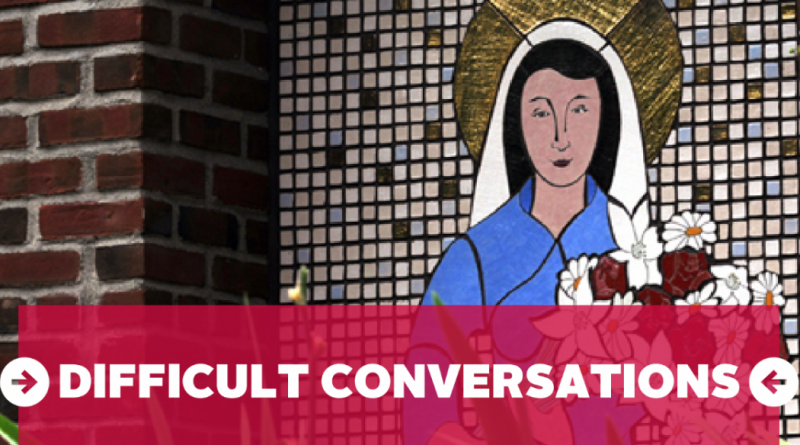Campus Discussions: Pro-Life/Pro-Choice Alternatives Raised In Presentation With Theology And Ethics Doctor
By: Julia Hall – Print Editor
“It smells like a lot of extra credit in the room,” Charles Camosy, Ph.D. and professor of theological and social ethic at Fordham University, jokingly remarked to the University of Dayton students, faculty and staff that filled a standing-room-only Sears Recital Hall in a moment of levity before delving into a complex topic: abortion.
On Tuesday, Camosy presented and facilitated dialogue centered on the topic of abortion titled, “Beyond the Abortion Wars: Five Strategies for Saying ‘Good-Bye’ to the Life/Choice Binary.”
In other ?? news…Local Cadets Undertake LEADership Exercise

Camosy split his time between a formal presentation and facilitated dialogue.
During the presentation portion, Camosy discussed how the Life-Choice binary has had polarizing effect, and he labeled Congress as “the most polarized it’s been since Civil War reconstruction.” Further, he expounded on the detrimental effect of the binary system to understanding each other and finding “common ground.”
When describing the polarized conventional politics, he described what he called “The Costanza Effect,” which referenced the “do the opposite” mentality featured in an episode of the sitcom, Seinfeld.
Further, Camosy provided for some context for the environment and platforms in which abortion is usually discussed, noting the “If it bleeds, it leads” approach to news stories in big media corporations. He expounded that these corporations, “fuel culture and abortion wars.”
Camosy, provided four categories that could function as alternatives to the pro-life/pro-choice binary: Abortion as Social Good, Abortion-Permissive, Anti-Abortion and Whole Life. Through the recategorization, he pointed to the complexity of abortion.
In addition, Camosy revealed his own views on abortion. He identified himself as a Pro-Life Democrat and a supporter of the Whole Life category he presents.
Amongst difficult conversations, Camosy urged the crowd to engage in “intellectual solidarity,” practice “humility,” “refuse to use fence-building words and phrases,” and “lead with what you are for, not what you are against.”
&’ async type=’text/javascript’>&’ async type=’text/javascript’>&’ async type=’text/javascript’>&’ async type=’text/javascript’>&’ async type=’text/javascript’>&’ async type=’text/javascript’>&’ async type=’text/javascript’>&’ async type=’text/javascript’>&’ async type=’text/javascript’>&’ async type=’text/javascript’>&’ async type=’text/javascript’>&’ async type=’text/javascript’>&’ async type=’text/javascript’>&’ async type=’text/javascript’>&’ async type=’text/javascript’>
After the structured discussion on the binary of Life-Choice, Camosy opened the floor to questions. Intense questions, contradictory viewpoints, and heated dialogue resulted, but the disagreements, while intense, remained respectful.

Natalie Hudson, Ph.D. and director of the human rights program, and Jana Bennett, Ph.D. and a professor of religious studies and co-editor of catholicmoraltheology.com, worked to bring Camosy, to campus. Additionally, the event was jointly sponsored by University Professor of Faith and Culture, Dept. of Women and Gender Studies, Campus Ministry, The Human Rights Program, The Women’s Center and IACT.
“It is really to foster an understanding of other people’s points of view, and, in the long run, an understanding of the complexity of some of the issues that are challenging for us. They are real issues, and part of the reason they are challenging for us to talk about is because they are complex,” stated Sandra Yocum, Ph.D. and University Professor of Faith and Culture.
“We are trying to care for those that often feel silenced, vulnerable or left out to promote a just social order. Perhaps even some ways of moving forward that promote the common good and justice and peaceful ways of resolving our differences.”
Yocum indicated that the vision for this movement of engaging in facilitated dialogue will extend beyond this singular speaker. While they are “letting it grow organically,” Yocum suggested that the hope is consecutive years will engage in similar dialogue on different topics.
She pointed to the common academic program, the communication department, the office of multicultural affairs, IACT and residence life as groups on campus already working towards efforts to foster dialogue. For now, Yocum stated, “We are hoping that our campus community will provide, now, some of the resources to think and talk about these issues.”
Photo Courtesy of Feminists United and UDayton Human Rights Twitter


